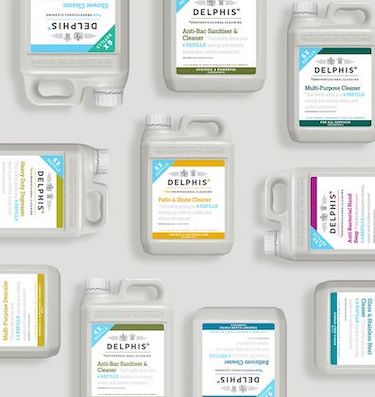 Cleanzine: your weekly cleaning and hygiene industry newsletter 10th July 2025 Issue no. 1170
Cleanzine: your weekly cleaning and hygiene industry newsletter 10th July 2025 Issue no. 1170
Your industry news - first
The original and best - for over 20 years!
We strongly recommend viewing Cleanzine full size in your web browser. Click our masthead above to visit our website version.
Can your contract cleaning business do more for the environment?
 More than six out of ten people in the UK want to see companies including contract cleaners act more sustainably - citing the use of recyclable packaging, less plastic, less waste, and mobilising renewable energy, as coming top of their wish list.
More than six out of ten people in the UK want to see companies including contract cleaners act more sustainably - citing the use of recyclable packaging, less plastic, less waste, and mobilising renewable energy, as coming top of their wish list.
A study of 2,000 adults by British cleaning chemical brand, Delphis Eco, found 76 per cent felt sustainability and climate change were very important to them. But it also emerged 56 per cent of us feel too many businesses are 'greenwashing' for marketing purposes rather than in a concerted effort to make a real difference to the planet.
Many people felt the motives for becoming more sustainable were self-serving, with businesses wanting to be seen as 'doing their bit' (39 per cent) and wanting to be seen as a 'market leader' (34 per cent) ranking among the top reasons for appearing sustainable. A third felt businesses wanting to save money, in the long run, was a factor for being more sustainable, compared to just 26 per cent who think it's due to a real desire to help the planet.
Mark Jankovich, CEO of Delphis Eco, which commissioned the study, said:
"Contract cleaners can only buy what is available to them, so it's important we give them options and help them understand how making the right purchasing decisions can help their own environmental pedigree. It's clearly important to customers that contract cleaners do business in the right way and this aspiration can only become stronger alongside the headlines we see linked to climate change and the erosion of our planet's resources.
"Increasingly, we are seeing businesses making a commitment to sustainability and importantly, setting targets to reaching Net Zero. It's easy for businesses to focus on direct carbon emissions, which they can influence (or offset) more easily within their business, but scope 3 emissions - which includes those indirect elements of the supply chain such as third-party cleaning chemicals - are easy to defer.
"We want to make sure we are doing all we can, by ensuring we're leading by example. Our cleaning chemicals are non-toxic, plant-based ingredients, yet they are extraordinarily powerful and do an exceptional job. All our packaging is made from 100% recycled plastic, and we offer refills. These are all elements which impact our margin, but we feel it's the right way of doing business.
"We would urge businesses to ask the question of their professional cleaning teams - what products are they using? Do they support their environmental targets and aspiration?"
The research also found 45 per cent of those polled felt businesses are not doing enough to improve their sustainability footprint alongside the inflationary challenges they are currently facing. Although smaller businesses (31 per cent) are considered more proactive than big businesses (22 per cent).
But 55 per cent think every individual's actions have an impact on the planet and they feel businesses have a big responsibility to ensure that their actions really do make a difference when it comes to protecting the planet.
Jankovich concluded: "It's encouraging to see just how important and valued most people are when it comes to our planet and increasingly, the need to protect our resources is being driven by the end consumer - our customers."
TOP 15 WAYS BRITS WANT BUSINESSES TO BE MORE ECO-FRIENDLY
1. Use recyclable packaging - 46%
2. Use less plastic - 45%
3. Use renewable energy - 42%
4. Use products which are more sustainable - 38%
5. Have more recycling bins in place - 37%
6. Refillable products - 36%
7. Recycle electronics - 36%
8. Use reusable shopping bags - 36%
9. Plant trees - 33%
10. Provide more information about how products are sourced - 31%
11. Use green cleaning products - 29%
12. Stop investing in fossil fuels - 28%
13. Choose to partner and work with other sustainable businesses - 27%
14. Donate more to environmental charities - 25%
15. Use cycle to work scheme - 21%
10th November 2022







